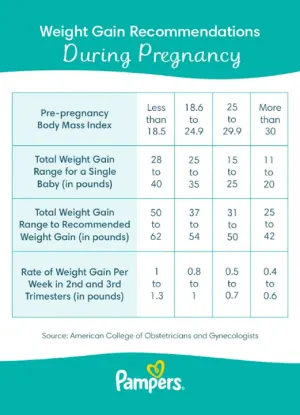Fill out your details:
How it works:
Use our Pregnancy Weight Gain Calculator tool to see what your estimated weight gain might look like in pregnancy. Input your current measurements into the calculator and get your results, displayed as a simple table with week-by-week guidance on what to expect.
The Pregnancy Weight Gain Calculator tool uses your Body Mass Index (BMI) to predict approximate changes to your weight as your pregnancy develops. Our results are based on U.S recommendations for estimated weight gain, from leading medical institutions.
What is a Pregnancy Weight Gain Calculator?
Weight gain during pregnancy is a natural part of pregnancy as your little one begins to grow. It’s important to track these weight changes as the week’s progress, to follow the healthy development of your little one and to check in on mom’s health, too.
There’s lots of ways that parents-to-be can track pregnancy weight gain, at home and with their health provider. It can be helpful to have an idea in mind of what weight gain changes to expect as you progress in your pregnancy and luckily, our Pregnancy Weight Gain Calculator can help!
A pregnancy weight gain calculator tool provides an estimation of what weekly weight changes to expect. Although weight changes are totally individual, following your progress can help reassure that you’re on the right track.
There are a few considerations for these predictions to be calculated:
The information you provide (pre-pregnancy weight, and height), help us to calculate your BMI. Plus, we take into account any special considerations like having twins.
Your BMI is then cross-checked against national recommendations for expected weight gain in pregnancy, for an estimation to be made according to your week in pregnancy.
For more information, don’t hesitate to consult your healthcare provider.
What is body max index? (BMI)
Our Pregnancy Weight Gain Calculator tool takes into account your personal Body Mass Index (BMI) when making estimates. BMI is a measure that considers a person’s weight and height to determine if a person’s weight is healthy. BMI is not an indicator of someone’s health status, but it can be used by healthcare providers to help anticipate if someone’s weight will have an impact on their health.
How is my estimated weight gain calculated?
Our Weight Gain Calculator tool is designed to do the calculations for you, in a matter of clicks!
First, enter your information (pre-pregnancy weight and height) into the calculator. This will give us your BMI. You’ll also need to indicate if you are expecting twins as this affects the estimations.
Our tool then quickly compares this value with the national recommended guidelines for weight gain in pregnancy, to predict what weight gain changes might happen for you in coming weeks. This is just a rough estimate, though.
Once you’ve hit “See expected weight gain”, you’ll receive a weight gain estimation for the week in pregnancy that you’ve provided. You can also refer to the handy prediction table to see what the recommended estimated weight gain is for each week of your pregnancy to come.
How do I read the estimated weight gain table?
Our Weight Gain Pregnancy Calculator is designed to be ultra-simple. Once you’ve inputted your measurements and hit “calculate”, the results table will appear. You will see your estimated weight gain for the week in question, and then below, a table of what the nationally recommended weight gain estimations are for every week in your pregnancy. There’s always the option to click on re-calculate if you want to change your measurements or week of pregnancy in the calculator.
Why is it useful to track pregnancy weight gain?
The Centers for Disease Control and Prevention (CDC) recommends that pregnant women should track their weight at the beginning and regularly throughout their pregnancy. By comparing your progress to the recommended ranges of healthy weight gain you can stay informed and reassured that you’re on the right track. Those who are under or over an ideal weight range at the beginning of their pregnancy may need extra monitoring with their healthcare provider to prevent any health complications.
With your healthcare provider, monitoring your weight changes will also help to indicate how your baby’s growth is coming along. If your weight gain is under or over what’s expected, this can indicate to the healthcare provider that some further monitoring or testing is needed to check everything is on track.
Setting appropriate goals for weight gain and tracking your progress should always be done in consultation with your healthcare provider throughout your pregnancy, but the Pregnancy Weight Gain Calculator tool is an extra way to follow your progress week by week and in the comfort of your own home.
What is a healthy pregnancy weight gain range?
Gaining the recommended amount of weight during pregnancy can support your baby’s well-being and healthy growth. A healthy pregnancy weight gain range is calculated using your pre-pregnancy body mass index (BMI). It is an estimated range of weight gain, with upper and lower limits, to suggest what a healthy weight gain might look like along your pregnancy.
See below a summary of estimated weight gain for women in pregnancy, according to their pre-pregnancy BMI. This table is based on the Institute of Medicine national recommended guidelines, sourced at the American College of Obstetricians and Gynecologists.

The Pregnancy Weight Gain Calculator is a great way to track your progress, but you should regularly consult your healthcare provider to discuss, monitor, and support your pregnancy weight gain goals.
What does it mean if I am outside of the weight gain estimation range?
Every pregnancy is unique so, as with all stages of pregnancy, there isn’t a one-size-fits all approach when it comes to weight gain. Falling within a recommended weight gain range helps keep you and your baby healthy and may reduce the risk of complications during your pregnancy and after. There is often lots that can be done to support your weight gain goals, such as maintaining a healthy pregnancy diet and exercising during pregnancy . However, there are many reasons for which falling outside of the range may also be perfectly okay for you and your baby – what’s important is checking in with your healthcare provider for any medical advice and diagnostics.
How we wrote this page:
The information in this page is based on the expert advice found in medical and government sources, such as the American Academy of Pediatrics and the American College of Obstetricians and Gynecologists. You can find a full list of sources for this tool below. The content on this page should not replace professional medical advice. Always consult medical professionals for full diagnosis and treatment.

